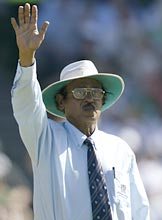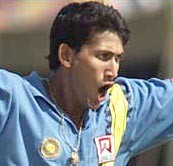Home > Cricket > Column > Makarand Waingankar
Spin experts pitch it wrong
June 12, 2003
Imagine a talented 14-year-old offspinner or left-arm spinner hoping to represent India in the under-15 limited overs Asia Cup tournament. If our spin legends have their way, the eager youngster will find that there is no interstate one-day tournament in which he can exhibit his talents for the junior selectors. He will then curse his foolishness in pursuing the art of bowling spin.
This is the most certain outcome if the Board of Control for Cricket in India implements the considered recommendation of the country's misinformed spin experts to ban domestic one-day tournaments for players under 17.
 The group of 12 experts, which includes the Fabulous Four of the 1960s and 1970s -- E A S Prasanna, Bishen Singh Bedi, Srinivas Venkatraghavan and Bhagwat S Chandrashekhar -- believes that too much one-day cricket is hampering the development of quality spinners in India.
The group of 12 experts, which includes the Fabulous Four of the 1960s and 1970s -- E A S Prasanna, Bishen Singh Bedi, Srinivas Venkatraghavan and Bhagwat S Chandrashekhar -- believes that too much one-day cricket is hampering the development of quality spinners in India.
The funny thing, however, is that they are seeking to ban something that does not even exist! So far the BCCI has not introduced any limited overs tournament for u-17 and u-15 players. If the experts are so ignorant of the state of the youth game, something must be seriously wrong somewhere.
The problem is that many of these experts do not have relevant data that can help them assess the trends. Theoretically they will argue for the ban mainly because in their playing days there was hardly any one-day cricket.
But youngsters today face a different situation. Though the BCCI has no one-day tournament for boys below 17, they can't stop schools and colleges playing limited overs tournaments. And the boys have no option but to play in these tournaments, where they necessarily have to bowl a restrictive line.
Yet, there are spinners under 17 who have done exceedingly well. Most importantly, they perform on covered wickets. Since the software CRIC-PROG, which I had developed for the BCCI to unearth young talent, was brought into use, it has become inescapably obvious that there is tremendous talent in all the skills in the game.
Are the experts aware that there is a 17-year-old offspinner named Amol Kokje from Indore, Madhya Pradesh, who has taken 50 wickets each in under-19 and under-25 interstate tournaments? A total of 100 wickets in three months of cricket, some of which he has taken in limited overs tournaments.
Are they aware that a 15-year-old boy named Piyush Chawla from Aligarh in Uttar Pradesh captained the India u-15 side and was vice-captain of the u-17 side? He is a legspinner and an attacking lefthanded batsman. The chairman of the Talent Resources Development Wing of the BCCI, Dilip Vengsarkar, is a strong supporter of the boy's talent.
It may sound harsh, but if one were to compare data of the performances of past and present spinners, the latter lot has shown far greater adaptability to both versions of the game. In fact, the young spinners have a valid point when they say that in the past the spinners bowled mostly on uncovered wickets and rank bad turners.
There are more than a dozen young spinners performing consistently today, but unfortunately there has not been enough international exposure. That's possibly why the experts feel that we don't have young talent.
In fact, the data in the CRIC-PROG software reveals that we do not have batsmen capable of consistently putting up big scores. The huge numbers of dot balls indicate a mentality of trying to play too many big shots and just not bothering about rotating the strike. If anything, it appears that too much of one-day cricket is affecting the batsmen more than the spinners. Young spinners have shown tremendous adaptability, but the area of dismissal of batsmen remains the same, whether they are playing the shorter or the longer version of the game.
Talking to young cricketers, one gathers the impression that they are forced to play a certain type of game by their coaches, most of whom are not even qualified to coach. The mutual admiration society of parents and coaches formulates a strategy to promote the careers of their wards. Besides, they, as per their convenience, pick up certain points from the commentary on television. No matter what the state coach might say, these kids will go back to a person who is close to the decision-makers in his life.
This is where I feel the National Cricket Academy must step in. The present infrastructure can only take care of the top 20 players in each age group. Shouldn't there be a plan to guide and monitor the progress of the others?
The ideal solution is to have an indoor cricket school in each of the five zones. These schools can cater to the demands of talented boys from those zones. A coaching link can be established between zonal indoor cricket school coaches and state coaches. And the boys trained at these zonal centres can be sent to the NCA in Bangalore.
This process will lead to uniformity of approach and the boys can get guidance throughout the year, which does not happen at present. Even the boys who are trained at the NCA for a month don't get adequate guidance for the remaining 11 months. Gradually, errors creep into their techniques and their talent gets corrupted and performances slide.
 With so much of junior cricket played in India for the past three decades, the system has been unable to produce many good cricketers. Take fast bowlers for example. Except for Ajit Agarkar, who started out as a batsman until former England fast bowler Frank Tyson turned him into a bowler at the 1994 Cricket Club of India camp in Mumbai, none of the fast bowlers playing in junior tournaments has gone on to play for the country. Same is the case with spinners. Banning one-day tournaments is not going to solve this problem.
With so much of junior cricket played in India for the past three decades, the system has been unable to produce many good cricketers. Take fast bowlers for example. Except for Ajit Agarkar, who started out as a batsman until former England fast bowler Frank Tyson turned him into a bowler at the 1994 Cricket Club of India camp in Mumbai, none of the fast bowlers playing in junior tournaments has gone on to play for the country. Same is the case with spinners. Banning one-day tournaments is not going to solve this problem.
A conclave of coaches and captains at the junior level may reveal certain facts that can help the system produce better results. But the experts need to make presentations and recommendations based on facts.
Indian cricket needs experts, but not of the armchair variety. A few more meetings like the recent one and we will read more of bans than solutions.
More Columns